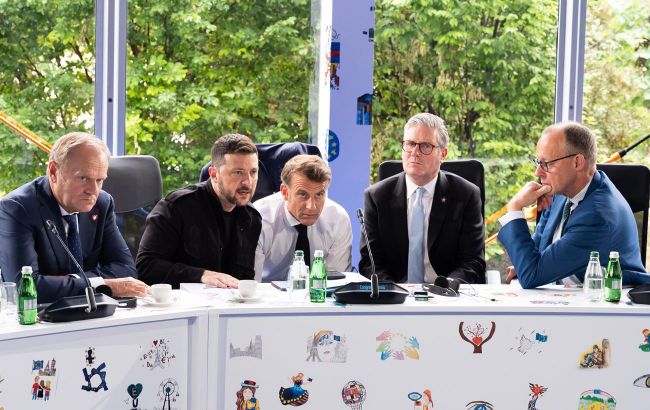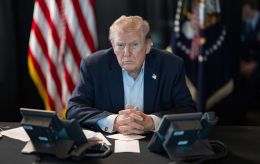Ukraine's anti-corruption scandal: Is Western support at risk?
 Donald Tusk, Volodymyr Zelenskyy, Emmanuel Macron, Keir Starmer and Friedrich Merz (photo: Getty Images)
Donald Tusk, Volodymyr Zelenskyy, Emmanuel Macron, Keir Starmer and Friedrich Merz (photo: Getty Images)
This week, Ukraine faced a political crisis surrounding the National Anti-Corruption Bureau of Ukraine (NABU) and the Specialized Anti-Corruption Prosecutor's Office (SAPO).
RBC-Ukraine explains how the West reacted over the week and whether the scandal will affect Ukraine's further relations with the US and EU.
Key questions:
- How did Western partners respond to attempts to limit NABU and SAPO?
- What are the differences in the positions of the EU and the US?
- Will Ukraine face punitive measures?
For perhaps the first time since the start of Russia’s full-scale invasion, the main events in Ukraine’s public life were not about the war or peace negotiations. Although the situation at the front remains tense, with continued heavy attacks on the rear, and another round of talks with Russia in Türkiye, real politics returned to Ukraine — albeit briefly. This, in turn, created new challenges in relations with Kyiv’s key partners.
Deep concern
On Monday, July 21, the Security Service of Ukraine (SBU) and the State Bureau of Investigation (SBI) carried out dozens of searches across the country targeting employees of the National Anti-Corruption Bureau of Ukraine (NABU) and the Specialized Anti-Corruption Prosecutor's Office (SAPO), on suspicions ranging from state treason to car accidents committed several years ago.
At the beginning of the week, events unfolded so rapidly that it was difficult to grasp their essence, both in foreign embassies in Kyiv and in the capitals of Ukraine’s key partners. Further confusion was added by the fact that European Commission President Ursula von der Leyen and European Council President António Costa were on a tour of Japan and China at the time.
The first reaction to the NABU situation from G7 ambassadors in Kyiv appeared only on the evening of July 21. “We met with NABU today, we are seriously concerned and intend to discuss these developments with the government leadership,” the ambassadors’ statement said.
They clarified that they seek to support transparency, independent institutions, and good governance. The following day brought even more reasons for concern.
On the afternoon of July 22, the Ukrainian parliament adopted bill No. 12414, which significantly curtailed the independence of NABU and SAPO.
European Commission spokesperson Guillaume Mercier stated that the EU is concerned about Ukraine’s recent actions regarding anti-corruption, institutions. "These bodies are crucial for Ukraine's reform program and must act independently to fight corruption and maintain public trust," Mercier stressed.
He also reminded that the EU provides Ukraine with substantial financial aid contingent on progress in transparency, judicial reform, and democratic governance. Translated from diplomatic language, this means: if Europe considers that Ukraine is failing to meet its anti-corruption commitments, funding may be suspended or reduced.
Talks with the president
In the hours following the bill’s adoption, both in Ukraine and abroad, there remained hope that President Zelenskyy would veto it. According to the Financial Times, French President Emmanuel Macron and the aforementioned António Costa tried to dissuade the Ukrainian president from signing the controversial bill. They called Zelenskyy right before the signing — literally at the last moment.
G7 ambassadors in Kyiv also demanded that the bill not be signed. One ambassador told the Financial Times that they were allegedly held in a locked room without phones for over two hours, so they could not inform their governments about Zelenskyy’s intentions.
Dutch Foreign Minister Caspar Veldkamp stated that such actions are a serious step backward in Ukraine’s EU integration process. Polish Foreign Minister Radosław Sikorski emphasized that Zelenskyy was told that the worst thing he could do now is abandon the fight against corruption, as Ukrainians are fighting for an honest, European state.
President Zelenskyy later said he had not spoken to Ursula von der Leyen that week.
There was no public reaction from the White House, but two influential senators issued a statement. Members of the Senate Foreign Relations Committee, Democrat Jeanne Shaheen and Republican Lindsey Graham, expressed concern that the law undermines much of Ukraine’s anti-corruption progress. They once again reminded that one of the most common arguments for ending support to Ukraine is the country’s perceived corruption.
In this context, controversial far-right US Congresswoman Marjorie Taylor Greene spread false information about protests that erupted in Ukraine. She claimed the protests broke out because Zelenskyy “refuses to stop the war.”
Attempts to walk back the situation
After two days of protests and talks with Western partners, President Zelenskyy made some concessions. On the evening of July 23, he announced that a presidential bill would soon be submitted to the Verkhovna Rada to strengthen the independence of anti-corruption institutions and eliminate any Russian influence on law enforcement agencies.
The bill introduced on Thursday essentially cancels the reduction of powers for anti-corruption agencies, though it includes several new provisions. For example, it foresees polygraph testing for NABU employees.
Immediately after Zelenskyy's statement, on July 24, the European Commission said it welcomes the drafting of a new bill to normalize the work of NABU and SAPO.
“We welcome the fact that the Ukrainian government is taking action, and we work with them to make sure that our concerns, which have been clearly explained yesterday and day before yesterday (July 22–23 – ed.), are indeed taken into account," the EC stated.
G7 ambassadors also welcomed the decision regarding NABU and SAPO.
That same day, Volodymyr Zelenskyy had a talk with UK Prime Minister Keir Starmer.
“I informed him about the preparation of a bill that will strengthen the law enforcement system and ensure the independence and effectiveness of anti-corruption infrastructure. Keir suggested involving experts who could be useful for long-term cooperation,” the president of Ukraine said.
According to him, he and the British prime minister agreed to stay in touch on the issue.
The talk with German Chancellor Friedrich Merz also partly addressed resolving the situation around NABU and SAPO. “I proposed that Germany join the expert review of the bill. Friedrich expressed readiness to assist,” Zelenskyy said.
“Perhaps a dialogue should have been held. Communication is always necessary,” the president told reporters on July 24.
He added he remains focused on the war in Ukraine. “Because right now, the number one issue in Ukraine is the war,” the president said.
Brussels is monitoring developments, maintaining dialogue with Kyiv. Taras Kachka, the new Deputy Prime Minister for European and Euro-Atlantic Integration of Ukraine, informed Enlargement Commissioner Marta Kos about the new legislative initiative and said that “the bill takes into account the concerns of experts and the international community.”
Kos, in turn, said she is “closely following developments.” She stressed that the rule of law and EU values are not just membership criteria, “they are what Ukrainians want.”
By Friday evening, official information emerged that the EU would cut the next tranche to Ukraine under the Ukraine Facility program — Kyiv will fall short by €1.5 billion. Although officially it was explained by other issues related to reforms (decentralization, ARMA reform, judge selection for the High Anti-Corruption Court), a source from RBC-Ukraine reported that the reduced amount will not be provided until the situation with NABU and SAPO is resolved.
***
This week’s events may have far-reaching consequences both for Ukraine’s domestic politics and for relations with Western — primarily European — partners.
De facto, until now, the EU (with some exceptions like Viktor Orbán) had observed an unofficial moratorium on criticizing the Ukrainian government, to avoid weakening Ukraine’s already difficult position in the face of Russian aggression. But now, for the first time, official-level criticism has been voiced in Brussels, while Western media were even more candid in their assessments.
Direct and harsh “punishment” for Ukraine over its recent actions is unlikely in the near future — provided that the new bill is successfully passed by the Verkhovna Rada next week. However, as a result of these events, Ukraine has certainly not made any task on the European track easier: neither receiving additional aid nor moving toward EU membership.
Sources: statements from Ukrainian, European, and American politicians, and articles from the Financial Times, Reuters, and Politico.



